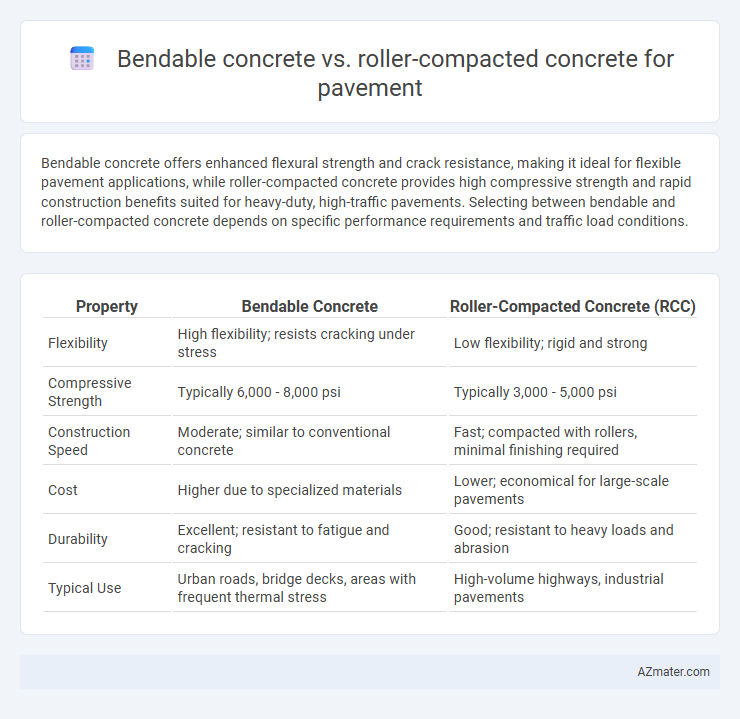Bendable concrete offers enhanced flexural strength and crack resistance, making it ideal for flexible pavement applications, while roller-compacted concrete provides high compressive strength and rapid construction benefits suited for heavy-duty, high-traffic pavements. Selecting between bendable and roller-compacted concrete depends on specific performance requirements and traffic load conditions.
Table of Comparison
| Property | Bendable Concrete | Roller-Compacted Concrete (RCC) |
|---|---|---|
| Flexibility | High flexibility; resists cracking under stress | Low flexibility; rigid and strong |
| Compressive Strength | Typically 6,000 - 8,000 psi | Typically 3,000 - 5,000 psi |
| Construction Speed | Moderate; similar to conventional concrete | Fast; compacted with rollers, minimal finishing required |
| Cost | Higher due to specialized materials | Lower; economical for large-scale pavements |
| Durability | Excellent; resistant to fatigue and cracking | Good; resistant to heavy loads and abrasion |
| Typical Use | Urban roads, bridge decks, areas with frequent thermal stress | High-volume highways, industrial pavements |
Introduction to Bendable and Roller-Compacted Concrete
Bendable concrete, also known as fiber-reinforced concrete, offers enhanced tensile strength and flexibility, reducing cracking in pavement applications. Roller-compacted concrete (RCC) is a zero-slump concrete mixture, compacted with rollers, providing high density and rapid setting ideal for heavy-load pavements. Both materials serve distinct structural roles, with bendable concrete improving durability through ductility and RCC optimizing construction speed and strength for infrastructure projects.
Key Material Properties Comparison
Bendable concrete exhibits superior flexural strength and crack resistance compared to roller-compacted concrete, making it ideal for pavements subjected to heavy traffic and dynamic loads. The high tensile strain capacity of bendable concrete reduces fatigue cracking, while roller-compacted concrete offers higher compressive strength and rapid construction benefits due to its zero-slump consistency. Both materials differ significantly in modulus of elasticity and durability, with bendable concrete providing enhanced flexibility and roller-compacted concrete excelling in compressive load-bearing applications.
Flexural Strength and Crack Resistance
Bendable concrete offers superior flexural strength compared to roller-compacted concrete (RCC), allowing it to withstand higher tensile stresses without cracking. It incorporates engineered fibers that enhance crack resistance by enabling controlled micro-cracking, improving pavement durability and lifespan. RCC, while cost-effective and strong in compression, is more prone to brittle failure and surface cracking under flexural loads, limiting its performance in flexible pavement applications.
Construction Methods and Equipment Required
Bendable concrete for pavement utilizes a fiber-reinforced mix that enhances flexibility and crack resistance, requiring standard concrete mixing equipment and conventional placement tools such as screeds and trowels. Roller-compacted concrete (RCC) employs a drier concrete mix placed with heavy roller equipment similar to asphalt paving machinery, enabling rapid compaction and minimal finishing. Construction of bendable concrete emphasizes careful fiber distribution and controlled curing, while RCC construction focuses on precise layer thickness and aggressive compaction to achieve high-density pavement.
Installation Time and Efficiency
Bendable concrete offers faster installation times due to its lightweight and flexible properties, allowing for quicker placement and reduced curing periods compared to traditional materials. Roller-compacted concrete (RCC) benefits from efficient installation through the use of heavy machinery that enables rapid laying and compaction, making it ideal for large-scale pavement projects with minimal labor. The overall efficiency of bendable concrete suits smaller, repair-focused applications, while RCC excels in durability and speed for extensive pavement construction.
Durability and Maintenance Needs
Bendable concrete offers superior crack resistance and flexibility, significantly enhancing pavement durability compared to traditional roller-compacted concrete (RCC), which is more prone to brittle failure under stress. The maintenance needs for bendable concrete are reduced due to its ability to better accommodate thermal expansion and heavy loads without extensive repairs, whereas RCC often requires more frequent surface patching and joint sealing. This makes bendable concrete a more cost-effective choice for long-term pavement performance, especially in high-traffic or variable climate conditions.
Cost Analysis and Economic Factors
Bendable concrete, with its enhanced tensile strength and flexibility, often incurs higher initial material costs but can reduce long-term maintenance expenses due to its crack resistance, making it economically advantageous for pavements subject to dynamic loads. Roller-compacted concrete (RCC), characterized by lower material and construction costs and faster placement times, offers cost efficiency for large-scale pavement projects but may require more frequent repairs, influencing lifecycle costs. A comprehensive cost analysis must weigh initial investment against durability and maintenance expenses to determine the optimal economic solution for specific pavement applications.
Environmental Impact and Sustainability
Bendable concrete offers enhanced durability and crack resistance, reducing maintenance frequency and associated resource consumption, making it an environmentally favorable choice for pavement applications. Roller-compacted concrete (RCC), with its lower cement content and faster placement, minimizes carbon footprint and construction energy use, contributing to sustainability goals. Both materials improve pavement lifespan, but bendable concrete's flexibility and RCC's rapid application balance environmental impact in varied infrastructure projects.
Suitability for Various Pavement Applications
Bendable concrete offers enhanced flexibility and crack resistance, making it suitable for high-stress pavement areas like intersections and industrial zones where heavy loads and temperature fluctuations occur. Roller-compacted concrete provides rapid construction and strong load-bearing capacity, ideal for highways, parking lots, and airport runways requiring durable surfaces with fast turnaround times. The selection between bendable and roller-compacted concrete depends on specific pavement performance requirements, environmental conditions, and traffic intensity.
Future Trends and Innovations in Concrete Pavements
Bendable concrete offers enhanced crack resistance and durability for pavements by incorporating fibers that improve tensile strength, making it a promising material for long-lasting road surfaces. Roller-compacted concrete (RCC) enables rapid construction and high load-bearing capacity, with innovations focusing on optimizing mix designs and integrating recycled materials to boost sustainability. Future trends involve combining the flexibility of bendable concrete with the efficiency of RCC to develop hybrid pavements that maximize performance and reduce environmental impact.

Infographic: Bendable concrete vs Roller-compacted concrete for Pavement
 azmater.com
azmater.com